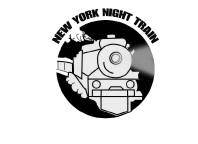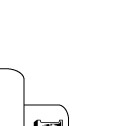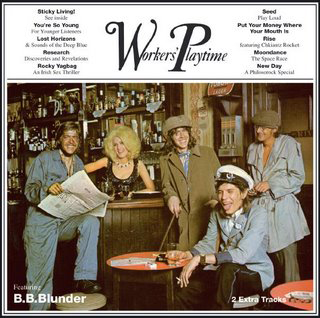
 |
 |
||||||||
| June 2006: SPOTLIGHT ON... B.B. BLUNDER
GRAND MAL'S BILL WHITTEN AND JAMES BEAUDREAU INTRODUCE BRITISH GUITAR LEGEND BRIAN GODDING AND THE LOST CLASSIC, WORKER'S PLAYTIME Hello Brian. What are you currently working on? My car! B.B. Blunder’s predecessors The Blossom Toes (who should be a subject for another entire interview) began by making an ornate psychedelic album (We are ever So Clean). Their sound then evolved in a bluesier/ballsier direction (If Only for a Moment) while still retaining psychedelic elements. Worker’s Playtime continues that evolution towards a more ‘rock’ sound but the album still retains psychedelic moments – including extended fade-outs, ambient instrumental tracks, etc. Is it a fair description to use the word ‘psychedelic’? How would you have described the band’s sound back then? I always had an issue with the word 'psychedelic' (apart from being very hard to spell!). I actually have no idea what it means. If it means “music for the imagination,” then 90% of classical music must be psychedelic, to say the least. But if it just points to a certain period in time when musicians and composers were, supposedly, hooked into certain class A drugs of an illusionary (and delusional!) nature, then I'm a bit lost. I mean, for instance, Howling Wolf (!) "Smokestack Lightning" (!!) how weird and wonderful is that! As far as Blossies Ever so Clean panned out, to me, it was a compilation of songs and arrangements put together under a certain amount of duress. Pretty much aimed at the 'fashion' and 'lifestyle' statements being made by our peers and generation and really had very little to do with what the band had been used to doing on the road. Bands of the period (60s) survived by playing anywhere and everywhere and the sudden switch to a almost exclusively studio lifestyle was fun for a limited period of time but groups need to get out there and make some serious noise and see a bit of the world in the process. (Look what happened to the best rock band of the time, the Beatles.) So the only way for the Blossies to continue as a band was to somehow get back to being able to perform 'live' again (and by that I mean be able go out and deliver a convincing set of rock type music within our capabilities as a quartet). So we re-invented the band with the Only for a Moment album and this music formed the basis of the band's live show till we disbanded. If either of these albums had been successful who knows what may have been, but it was not to be! Workers Playtime was, to start with, a studio project (loosely based on a film score which eventually never happened) and gave us the opportunity to “get people in to contribute,” which was a pretty popular thing to do at the beginning of the 70's. I personally have good memories of making that album because (unlike Ever so Clean) we had total control of what ended up on tape -- for better or worse! The album was not received well by the music business at the time. It was like all the drugs had begun to wear off from the previous 4-5 years and the true nature of the beast was re-emerging: nothing left to do but ridicule, dismiss, and put two fingers up to anything new. The fact that the album has been reissued now is, to me, very comforting, because I always knew it was an honest piece of work by all concerned and never deserved to be written off with such disdain and venom. But as
regards to how I would describe the band sound…as far as Blunder
is concerned, me, Big
Bryan Belshaw and Kevin
Westlake really used to enjoy stretching out and stopping
when we were knackered! Not forgetting that like many other bands
we were totally seduced by 24 track recording. (There was a lot
of learning to do at that time, and learning to know when to STOP
became critical!) So I suppose the sound was our naive but genuine
attempt at 'orchestrating' the three-piece rock setup. (Sort of!)
Yes, it certainly was! But we were, in reality, not in the same league as these guys. These bands were all huge commercial successes (quite rightly as far as I'm concerned). But everything has its kick-on -- their success opened plenty of doors of opportunity for us “fringe artists.” The Stones indirectly financed the Blunder album (through their company) and we had access to their rehearsal studio and equipment (courtesy of the late Ian Stewart, their road manager and the keyboard player on their albums). Paul McCartney bought me a scotch and Coke once! And Pete Townsend told me fuck off on numerous occasions!! How was it that Julie Driscoll came to sing on your album? Did you do any live shows with her? I've known Julie since the mid-sixties and wrote her 1st solo single, I Know You Love Me Not (on Parlophone). Also, by the time we were recording Blunder, she was my sister in law. So she had little choice! The Blossies contributed a fair bit to her first solo album Julie Driscoll 1969 on Marmalade [recently reissued on Eclectic Records – ed.]. I personally toured with Julie promoting her second solo album, Sunset Glow on Utopia Records, and played a fair bit on it as well. So there's quite a bit of history there. How was the song "Sticky Living" written? Did you guys develop the monster riff in the Blossom Toes/B.B. Blunder communal home? And how did that nifty horn arrangement featuring Marc Charig (trumpet) and Nick Evans (trombone) come about? “Sticky Living” was written by me and it was brought to life by Brian and Kevin on the day in the studio. If I remember correctly, Julie came down to add some vocal cred' to the song and Keith Tippett [who Brian played with on the legendary prog extravaganza Septober Energy- ed.] suggested maybe a couple of horns would be good on the chorus and the bridge. Mark and Nick took a few prompts from me and sorted the rest out themselves. And at the end I suggested they go into free improv and we'd fade everything else out because that's what those guys do best. On the song “New Day” Mick Taylor plays slide guitar. How did that come about? Well this was simply that he heard a demo of the song someone was playing up at the Stones office (he was with the Stones by then) and got in touch to ask if he could play on it. Great blues slide player and a really lovely gent! That was a real pleasure for me. My only regret is that he's not loud enough in the mix! (Not my fault… I wasn't there and we couldn't afford to remix it, shit!) Who were the “Combined Forces Network Choir” who sang on “New Day?” Basically everybody and anybody we could drag into the studio! The basis was a bunch of “proper” singers like Julie, Reggie, a rock group called Gypsy, and Doris Troy (I think). And the rest were recording engineers, tape-op's, vagrants, taxi drivers etc.! Liners to the new CD reissue blame some of the absence of Workers’ Playtime’s success on the band's name and album cover (at least the second point seems absurd – the record cover is great). Have you thought about why the album didn't do well and why it has flown under the radar so long? Who knows why some things go and some things don’t. As I said, the album got very cynical reviews by the so-called music press of the time. Actually, the cover was rated as far too good for the music within. Remarks like "Workers’ Playtime? Don’t give up your day jobs!” being among the rare humorous and less offensive slag offs! The Long Hair CD reissue sounds fairly similar to the vinyl version of Workers’ Playtime. Is the new release from the original master tapes? Does the reissue you offer on your site clear up the Dolby issues more than the Long Hair version? The Long Hair CD is straight off the master tape without the dreaded Dolby as are the CDs I have been offering. But I kind of have to offer Long Hair’s now, which is no bad thing as I like the way it's been put together. (By the way, it's also available on Airmail Recordings in Japan and they have issued it in a cardboard sleeve identical to the original vinyl but bonsai miniature version. It’s really great!) Workers’ Playtime shows a real knack for creating guitar orchestrations with overdubs, some of the best work of its kind along with Jimmy Page's. Were you influenced by Page or did you arrive at that sound independently? That's really kind of you to say so! It really was (as I said) a learning process at the time but I can truthfully say that I was not personally aware of what Jimmy was up to then. If anything, I was probably more influenced by the great American group, Spirit. They were making really cool and expansive albums. And don’t forget, stereo was still in its infancy then (great earphones music)! I was also starting to take the jazz-rock music of the time very seriously (Don Cherry, Miles Davis, etc.). All very exiting and mysterious! What were you/the band listening to at the time you were making Workers’ Playtime? As I said, Spirit were a fave' listen and of course the great collaborations taking place like Crosby Stills & Nash & Young. Multi track recording was opening possibilities up for everybody, but it was still new technology and open to artistic abuse. Don’t forget, it was only a few years prior that everything was 4 tracks max! Makes you realize how bloody good the Beatles and George Martin were at their craft. Do any live recordings exist of Blunder with the Action’s Reg King (who fronted the band for a handful of U.K. gigs)? Funnily enough, Reg's only solo album from that period has just been re-released on CD and vinyl. (Another reissue!) It’s on Circle Records – an English company. We played on quite a bit of it including “Little Boy” and “10,000 Miles.” Who are the guitarists that you admire today, and who were the guitarists you admired prior to the making of Workers’ Playtime? Jonny Mac, Allan Holdsworth, Eric Johnson, Larry Carlton, Glen Campbell (oh yes -- he's outrageously competent!). The late Ollie Halsall (good mate, great muso) Bill Frisell, oh god, it goes on… Jeff Beck!! In the Blunder days I was trying to come to terms with how f**ing good Ollie was and of course Hendrix was always a good reference point. But I've always tried to be a tone man, my primary influence being Hank Marvin. (Perfect!) What were some benchmark musical events in your life that opened your eyes /influenced your musical development? There are so many of them really. Like hearing the likes of Eddie Cochran, Fats Domino, Tennessee Ernie Ford, etc. when I was a kid. Then on to The Shadows (big!) and then The Beatles (even bigger!). Then Mr. Hendrix comes along with a totally new concept of rock/blues guitar playing allied to a cosmic concept of how to present his stuff on vinyl (talk about spacey!). And then I start meeting and playing with all the modern jazz guys like Keith Tippett and Mike Westbrook, so another new panorama unfolds. I would say working with Mike in his bands has been (musically) my biggest break and good fortune over the years. The musicians and music I've encountered through the 70s, 80s, and 90s have been extraordinary, and the probability is that if the Blossies hade “made it” none of that would ever have happened. I would have ended up some spoilt miserable old bastard like Ray Davies! Bob Dylan recently said modern recordings sound “atrocious,” and he also said “I don’t know anybody who’s made a record that sounds decent in the past 20 years, really” …what do you think? Has technology had a negative effect on music? Or is it that the players were better back in the ‘60’s and ‘70’s? Was the bar higher for entrance to the world of Rock and Roll? Yeah! Here we have the archetypal Grumpy Old Pop Star having a good old moan. For a man of his stature and maturity he should know better and keep those silly thoughts to himself! It's bullshit! If he's talking fidelity, sound recording has never been more accurately reproduced. Has he listened to the sound quality on Sting’s pop albums or the “immaculate conception” of John McLaughlin’s recordings and blah blah blah etc. Are there any currently working rock bands that you admire? I like loads of modern bands. Wales has always given birth to gutsy rock groups, and I really like the Stereophonics and the Manic Street Preachers. Oasis have made some mega records in pop terms. I really love Metal music in small but extreme doses! Anything really that goes the extra mile. It seems that the first half-decade of the new century has seen an extraordinary amount of obscure 60s and 70s records reissued on CD (including the “rediscoveries” of Bill Fay, Vashti Bunyan, Sibylle Baier, Linda Perhacs, etc.) It’s pretty amazing when you consider that there’s also more NEW music product being released every week than ever before. Do you have any thoughts about the ongoing fascination with records from the sixties and seventies/the reissue biz? I suppose it’s a pointer to the fact that music in its unadulterated form is timeless. I don’t want to sound arty farty but some music will always hold its relevance and in some cases become MORE relevant as time goes on. Why does a 1960's Vox AC 30 amp sell for more than a new Mesa Boogie? Why are “Strawberry Fields” and “A Day in the Life” still probably the most evocative pop recordings ever? All we know is that the answer to life and the universe is 42!
WORKER'S
PLAYTIME MENU
|
 |
||||||||
 |
|||||||||

